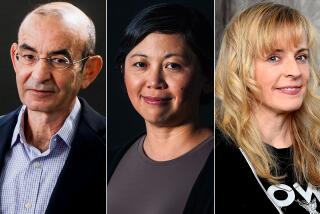Man Booker Prize no longer excludes American writers
When I lived in Britain, and in many subsequent visits there, I was always struck by the extensive coverage of the Booker Prize, an award for English-language fiction that is now known as the Man Booker Prize. No American newspaper, even the New York Times, ever lavished such attention on U.S. literary awards, including the Pulitzer Prize for fiction. Inclusion even on the “shortlist” of finalists for the Booker meant a jump in sales and appearances on the BBC.
What was strange about the Booker was that it purported to be international but excluded American novelists. It rewarded “the best novel of the year written by a citizen of the United Kingdom, the Commonwealth or the Republic of Ireland.” In that sense, it was an echo of the British Empire -- and rather like a kitschy BBC radio program I used to listen to called “Family Favorites.” The show linked up DJs from Commonwealth countries who dedicated songs to the far-flung seed of Albion.
But now the Booker is expanding its horizons. The Booker Prize Foundation announced the other day that henceforth the Man Booker Prize “will recognize, celebrate and embrace authors writing in English, whether from Chicago, Sheffield or Shanghai.”
If you’re thinking that Shanghai is normally not regarded as part of the English-speaking world, you’ve hit on the fact that the rules have been changed in more than the obvious way. Instead of simply adding U.S. citizens to citizens of other English-speaking countries eligible for consideration, the sponsors have softened the blow by letting citizens of any old foreign country compete -- so long as they write in English and their work is published in the United Kingdom.
The blackballing of Americans always struck me as as a form of protectionism, and also redolent of anti-Americanism. It was a literary version of “oversexed, overpaid and over here.” Other than to make a political statement, why deem Canada’s Margaret Atwood eligible but not her fellow North American Philip Roth?
Now that Americans are eligible for the Booker, the U.S. news media should return the favor by publicizing the prize to the same extent their British counterparts do -- even if the winners come from Sheffield. Or Shanghai.
ALSO:
California’s water house of cards
In Washington, countdown to a shutdown
More to Read
A cure for the common opinion
Get thought-provoking perspectives with our weekly newsletter.
You may occasionally receive promotional content from the Los Angeles Times.











